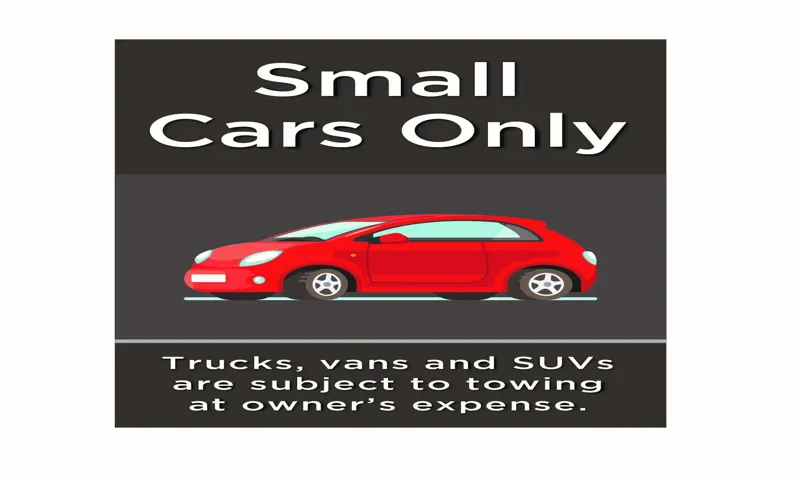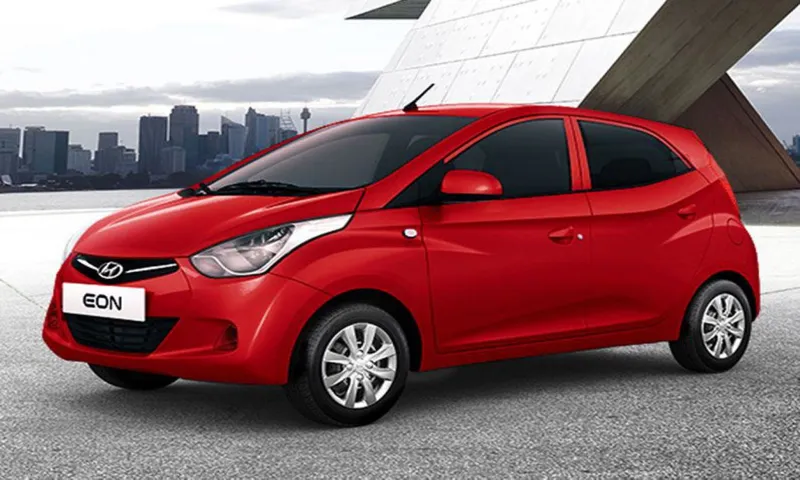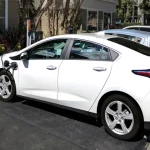Compact car only signs can be found in many parking lots or on the street. But what do they mean exactly? It can be confusing for people who are not familiar with the term or have never encountered such a sign. In most cases, it refers to the space limitations of the parking spot, and only vehicles that meet certain size requirements are permitted to park there.
The meaning of compact cars itself can vary slightly depending on the location, but the general rule is that a compact car is smaller in size compared to a mid-size or full-size car. In this blog post, we will dive deeper into what compact car only means and explore why parking lots have such restrictions. So, keep on reading to find out more!
Table of Contents
Defining Compact Cars
When it comes to cars, the term “compact” is often used to describe a particular type of vehicle. But what does “compact car” actually mean? Essentially, a compact car is a smaller-sized vehicle that offers a balance between affordability and efficiency. These cars are designed to be fuel-efficient, easy to maneuver, and less expensive than larger models.
They’re typically a popular choice for urban drivers who need a vehicle that’s easy to park in tight spaces, as well as for budget-conscious consumers who want a reliable vehicle without breaking the bank. While there are a few specific size restrictions that qualify a vehicle as a compact car, the term is more of a general descriptor than a specific definition. So, whether you’re looking for a small car for commuting or just want to save some money on gas, a compact car could be the perfect choice for you.
Length and Space Requirements
When it comes to defining compact cars, length and space requirements are key factors to consider. In general, a compact car is one that is smaller than a mid-size car and larger than a subcompact car. However, the exact size of a compact car can vary depending on a variety of factors, including the make and model of the car, as well as the country in which it is sold.
In the United States, for example, the length of a compact car is typically between 175 and 183 inches, while in Europe, the length of a compact car is generally around 161 inches. In addition to length, space requirements are also important when it comes to defining compact cars. These cars should have enough interior space to comfortably seat four passengers, as well as enough trunk space for luggage and other cargo.
Overall, defining what is considered a compact car is a complex process that requires taking into account a variety of different factors.

Fuel Efficiency and Environmental Impact
Compact cars have been around for quite some time now, and with the constant rise in fuel prices, they have become increasingly popular. These vehicles are designed to be small and fuel-efficient, making them an excellent choice for those looking to save money on gas and reduce their environmental impact. But what exactly defines a compact car? Generally speaking, a compact car is a small, affordable vehicle that is between subcompact and midsize.
In terms of size, they tend to be shorter and narrower than midsize cars, but offer similar features such as good handling and comfortable interiors. So, if you’re looking for a car that is easy to park, great on gas mileage, but still has sufficient interior space, then a compact car may be the perfect fit for you.
Benefits and Drawbacks of Compact Cars
“What does compact car only mean?” is a common question for those who are in the market for a new car. Compact cars are smaller in size compared to full-size sedans, SUVs, and trucks. As the name suggests, compact cars are designed to be more convenient for city driving and parking.
They usually get better gas mileage, which makes them a great choice for commuters or those looking to save money on fuel costs. Compact cars are also more affordable than larger vehicles, both when purchasing and maintaining. However, the drawback of compact cars is that they may not be ideal for families or those who need more space for passengers or cargo.
They may also have less powerful engines, which could impact their performance on highways or during long trips. Overall, buying a compact car only means that you need to consider your lifestyle and priorities before making a purchase.
Lower Cost and Maintenance
Compact cars are an increasingly popular choice for drivers looking to save on cost. One of the main benefits of owning a compact car is the lower purchase price compared to larger vehicles. Additionally, compact cars often have better fuel efficiency, further reducing costs at the gas pump.
Maintenance costs for compact cars are also generally lower than for larger vehicles. However, there are some drawbacks to consider. Compact cars often have less interior space and may not be as comfortable for longer journeys.
Additionally, they may not perform as well in certain driving conditions, such as snowy or icy roads. Despite the drawbacks, the cost savings associated with owning a compact car can make them an attractive option for many drivers looking for a budget-friendly vehicle.
Limited Space and Comfort
Compact cars are ideal for those who are concerned about limited space and comfort. While these vehicles are smaller in size, they come with numerous benefits that can make them a smart and practical choice. For instance, compact cars are much more fuel-efficient than their larger counterparts, which makes them an eco-friendly option for those who are conscious about their carbon footprint.
Moreover, compact cars are easier to maneuver and park in congested areas, which is a huge advantage for city drivers who often struggle to find a parking spot. However, all these benefits come at a price. Compact cars tend to have limited space, which means that passengers may feel cramped and uncomfortable during long journeys.
This can be a deal-breaker for many people who value their comfort and convenience over fuel efficiency and convenience. Therefore, while compact cars are an excellent choice for some, they may not be suitable for everyone. In the end, it all depends on your personal preferences and priorities.
Ideal for Urban Driving and Shorter Trips
Compact cars are great for those who live in urban areas and need a vehicle that is easy to maneuver in tight spaces and does well on shorter trips. They offer great benefits such as fuel efficiency, lower insurance premiums, and lower maintenance costs. However, there are some drawbacks to compact cars.
Firstly, they tend to have less storage space for passengers and cargo. Secondly, due to their small size, they may not be as safe as larger cars in the event of a collision. Lastly, they may not be as comfortable for taller individuals due to limited legroom and headspace.
Despite these drawbacks, compact cars remain a popular choice for those who need a reliable and cost-effective vehicle for their daily commute or errands around town. So if you’re in the market for a new car and live in an urban area, a compact car may be an ideal choice for you!
Criteria for Compact Car Designation
When we see a car labeled as “compact,” we may wonder what that means exactly. Generally speaking, a car is considered compact if it’s smaller in size and more fuel-efficient compared to its larger counterparts, such as midsize or full-size cars. However, these days, the definition of a compact car can vary from one country to another.
For example, in the US, a compact car should have a total length of around 177 to 187 inches and a cargo volume of no more than 100 cubic feet. In Europe, a compact car should be no longer than 163 inches.
Other criteria for a compact car may include its curb weight, engine size, passenger capacity, and pricing. Ultimately, the designation of a “compact car” can help classify a vehicle into a particular category and determine its target market. However, it’s important to note that size alone shouldn’t be the sole factor in determining the best car for your needs.
Regulatory Standards and Requirements
When it comes to compact car designation, there are certain criteria that must be met in order for a car to be considered a compact vehicle. These criteria are set by regulatory standards and requirements and are based on several factors, including the car’s size and weight, its fuel efficiency, and its overall safety rating. In general, a compact car is defined as a vehicle that is smaller and more fuel-efficient than a mid-size or full-size car, but larger than a subcompact car.
Compact cars are designed to be more agile and efficient, making them ideal for city driving and everyday use. To be considered a compact car, a vehicle must meet specific size and weight requirements, as well as fuel efficiency standards. Safety features are also an important consideration, as compact cars must meet certain crash test and safety ratings to be deemed safe for use on the road.
Overall, the criteria for compact car designation are designed to ensure that these vehicles are safe, efficient, and practical for everyday use.
Automaker Manufacturing Guidelines
When it comes to designing and manufacturing compact cars, automakers have a set criteria that must be followed. First and foremost, the vehicle must have a maximum length of 5 meters.
Additionally, it must have a maximum engine size of 0 liters, with a maximum power output of 147 kilowatts. The car must also have a minimum weight of 1,000 kilograms, and a maximum weight of 1,400 kilograms.
Other design considerations include maximum fuel consumption, maximum CO2 emissions, and maximum noise levels. While these guidelines may seem strict, they are put in place to ensure that compact cars meet certain safety and environmental standards, while also providing drivers with an enjoyable and efficient driving experience. At the end of the day, automakers must balance these guidelines with the desires of their customers, but by sticking to these criteria, they can create innovative and reliable compact cars that meet the needs of drivers all around the world.
Conclusion
In short, a compact car can be described as the perfect balance of space and efficiency. It’s a vehicle that’s designed to offer the maximum amount of functionality and convenience while taking up minimal space. So, if you’re looking for a car that not only drives well but is also practical and economical, then a compact car may just be the perfect choice for you.
But be warned, trying to squeeze a family of six and all their luggage into a compact car is not advised, even if it’s advertised as a “compact SUV”. Remember, “compact” means just that – small but mighty.
FAQs
What is a compact car?
A compact car is a smaller-sized car that is designed for efficiency and better maneuverability in cities and tight driving conditions.
How is a compact car different from a sedan?
A compact car is generally smaller in size than a sedan, but with similar features and functionality. It is designed for greater fuel efficiency and maneuverability in urban settings.
Can you seat a family in a compact car?
While a compact car is smaller in size, there are many models that can seat families comfortably. It ultimately depends on the specific make and model.
Are compact cars safe to drive?
Yes, many compact cars are equipped with advanced safety features such as airbags, electronic stability control, and anti-lock brakes. It’s important to research the safety ratings of a specific model before buying.
What is the fuel economy of a compact car?
Compact cars are known for their fuel efficiency and can often get up to 40 mpg on the highway, depending on the make and model.
Can a compact car handle long road trips?
Yes, many compact cars are designed for long road trips and can provide a comfortable ride for hours on end. However, it’s important to consider the size and storage capacity for luggage and other belongings.
What does “compact car only” mean for parking spaces?
“Compact car only” means that the parking space is designed to fit smaller-sized cars, such as compact cars, subcompacts, and some hatchbacks. Larger cars, SUVs, and trucks may not fit in these spaces.



